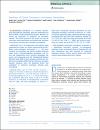Predictors of Clinical Outcomes in Autologous Cranioplasty

التاريخ
2022المؤلف
Safi, SalehAli, Arshad
Abdelhafez, Ibrahim
Salam, Abdul
Alrabayah, Talal
Alyafei, Abdulnasser
Belkhair, Sirajeddin
...show more authors ...show less authors
البيانات الوصفية
عرض كامل للتسجيلةالملخص
Background
Cranioplasty is a common neurosurgical procedure and autologous grafts are preferred due to their aesthetic and biocompatibility benefits. Multiple risk factors are implicated as predictors for neurologic outcome. This study focuses on risk factors that may be associated with complications and analyzes the predictors of neurologic outcomes after autologous cranioplasty.
Methods
This is a retrospective observational study conducted at a tertiary care center between 2015 and 2021. Adults with autologous cranioplasty (n = 132) were recruited from procedure logs and the hospital electronic health record. Clinicodemographic parameters, risk factors, and complications were recorded. Neurologic outcomes were measured using the dichotomized Glasgow Outcome Scale (GOS). Primary outcome measure was pre- and post-cranioplasty GOS at the last follow up. Secondary outcome measures were the predicting factors that contributed to enhanced neurologic outcome post-cranioplasty.
Results
Mean age was 41.4 (standard deviation ± 13.5) years with male predominance (12.2:1). Complications developed in 12.9% (n = 17), with infections in 3.8% (n = 5) and hydrocephalus in 2.3% (n = 3). In bivariate analysis, pre-cranioplasty GOS good grades 4 and 5 (P < 0.001), trauma as an indication for decompressive craniectomy (DC) (P < 0.001), and early cranioplasty ≤12 weeks (P = 0.023) were statistically significant predictors for post-cranioplasty neurologic recovery at follow-up. In a multiple logistic regression model, adjusted odds ratio for pre-cranioplasty GOS was 28.77 (95% confidence interval [CI] 7.21–114.74, P < 0.001), for trauma as indication for DC was 5.15 (95% CI 1.65–16.05, P = 0.003), and for early cranioplasty ≤12 weeks was 3.04 (95% CI 1.12–8.27 P = 0.029).
Conclusions
Autologous cranioplasty contributes to a quantifiable neurologic outcome. Pre-cranioplasty neurologic status, cranioplasty done for traumatic DC and early cranioplasty may have potential for enhanced neurologic recovery. Further clinical studies with better evidence may expound upon these findings.
المجموعات
- أبحاث الطب [1684 items ]


